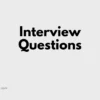Top Common Video Interview Questions
Common Video Interview Questions and Tips
To help you prepare for a video interview, here are some common questions:
- ‘Tell me about yourself.’
- ‘Why do you want this job?’
- ‘What are your strengths and weaknesses?’
It is essential to prepare for these in advance. For instance, research the company, review the job description, and practice your responses.
Projecting Confidence and Professionalism
During video interviews, you should project confidence, professionalism, and enthusiasm for the job. Regardless of the format, the fundamentals of interviewing remain the same. Therefore, aim for a mix of 80% professional and 20% personal information in your responses, highlighting your skills, work experience, and relevant personal facts.
Avoid Negative Comments
When asked why you are seeking a new position, candidates should avoid badmouthing previous employers or coworkers. Instead, they should explain what attracted them to the job posting by mentioning aspects of the company culture or positive feedback they’ve heard about the organization.
Researching the Company
Researching the company before an interview is crucial. Candidates should:
- Visit the potential employer’s website.
- Check social media accounts to learn about their products/services, headquarters, competitors, and core values.
This preparation allows candidates to demonstrate their knowledge and genuine interest in the company during the interview.
Utilizing Your Experiences
Take this opportunity to talk about how your past experiences have helped prepare you for this job. Mention any success you experienced in a previous position that shows you are the right candidate.
Your response should relate to the job description and your ability to perform the tasks assigned to you. For example, if interviewed for a position leading a large group of people, discuss your strong communication skills and ability to work with various people and personalities.
Additional Preparation Tips
To further prepare, you should:
- Spend some time on practice questions provided to you.
- Look at the company website to understand their culture and values.
- Read through any guidance notes from the recruiter and follow their instructions.
- Go through your CV or application form and prepare examples to show you have the skills and experience.
- Use the STAR method to help structure your answers.
- Prepare answers to common interview questions.
- Have some questions of your own ready to ask.
Technical Preparations
Make sure you plug in or charge your equipment and that your internet connection is good. Log in with at least half an hour to spare so you can check everything is working well.
Dress Code
Wear smart clothes that look professional. Choose something plain that does not look distracting on camera. Avoid a lot of jewelry and anything that could distract you or be noisy when you move.
Practice Runs
You should do some practice runs, ensuring that you:
- Speak clearly without talking too fast.
- Pause at the end of a question to avoid talking over the interviewer.
- Smile and show interest.
- Sit up straight and maintain good body language.
- Keep good eye contact by looking at your camera rather than the screen.
Post-Interview Reflection
After the interview, write down:
- 2 or 3 things that you think went well.
- 2 or 3 things that you think you could improve next time.
Red Flags and Tips for Success
Key red flags include:
- Lack of preparation
- Technical issues
- Lack of enthusiasm
- Signs of cheating or unethical behavior
- Poor body language
Be vigilant and use both AI tools and your judgment to identify these warning signs. Additionally, don’t talk too fast, mumble, or miss using a good structure in your answers. Your goal is not only to provide solid answers but also to appear at ease and comfortable with the camera.
The STAR method is a structured approach for responding to behavioral-based interview questions by discussing the specific situation, task, action, and result of the scenario you are describing. Get video interview tips, such as choosing an appropriate location, what to wear, and how to troubleshoot technical issues, to make a good impression.
Effective Responses for Video Interviews
In today’s digital age, one-way video interviews have become an integral part of the hiring process. As a job seeker, effectively answering one-way video interview questions is crucial to make a strong first impression on potential employers. Here are some expert techniques to help you tackle popular one-way video interview questions with confidence.
- Practice Makes Perfect: Rehearse your answers multiple times to ensure you sound confident and natural during the recording.
- Employ the STAR Technique: When answering behavioral questions, use the Situation, Task, Action, Result (STAR) technique. This framework helps you provide detailed and structured responses.
- Highlight Soft Skills: Emphasize skills such as teamwork, adaptability, and problem-solving. Use specific examples to demonstrate these skills in action.
- Maintain Eye Contact: Even though you’re recording alone, displaying positive body language enhances your presentation.
- Time Management: Most one-way interviews have time limits for responses. Practice answering questions within the given time frame to avoid rushing or dragging on.
- Professional Appearance: Dress as you would for an in-person interview. A professional appearance boosts your confidence and creates a positive impression.
- Preparation is Key: Mastering one-way video interview questions requires preparation, practice, and effective communication skills.
- Align Past Experiences: Prepare for common background and experience questions by strategically aligning your past experiences to showcase their direct relevance to the role you’re pursuing. Common questions include:
- ‘Tell me about yourself.’
- ‘Can you walk us through your resume?’
- ‘Describe a challenging project you successfully managed.’
- The Highlight Reel Technique: This approach is effective for making your introduction impactful. Concisely overview your key roles, significant responsibilities, and notable achievements. For example: ‘In my previous role at [Name of your former company], I managed a team of 15, streamlined operations, and boosted productivity by 25%.’
- Utilize the STAR Method: For project-specific descriptions, narrate your accomplishments effectively using the STAR approach. For instance: ‘When faced with declining sales [Situation], I devised a new marketing strategy [Task], implemented targeted campaigns [Action]. As a result, we got an X% revenue increase within six months [Result].’
- Focus on Problem-Solving Skills: When discussing past challenges, concentrate on your approach and the outcomes achieved. For example: ‘In a previous project, I encountered a challenge where our team faced a tight deadline. I had to restructure tasks and implement efficient communication channels. As a result, we not only met the deadline but also improved overall project efficiency by X%.’
- Summarize Your Background: Provide a brief summary of your professional background, emphasizing your most relevant experience and skills. Focus on what sets you apart from other candidates and highlight any achievements that align with the role.
- Understand the Question Thoroughly: Take the time to comprehend the questions asked and tailor your answers accordingly.
- Keep Responses Concise: Ensure that your answers are direct and to the point, while still conveying the necessary information.
By following the tips outlined in this post and using real-life examples to demonstrate your expertise, you can stand out in the competitive job market.
Preparing for Video Interview Success
Video Interview Question Examples
Some typical video interview questions could include:
- What is your best quality?
- Why should we hire you for this role?
- Why do you want this job?
- What about this job excites you the least?
- Can you tell me about yourself?
- Why are you interested in working here?
- What do you know about our company?
- What’s your greatest accomplishment?
- What’s your ideal work environment?
- Where do you see yourself five years from now?
Initial Icebreaker Questions
You should expect to get a question or two to break the ice during the initial interview. These initial questions allow the hiring manager to learn more about you. Expect questions such as:
- Tell us about yourself.
- What made you apply for this job?
Personality and Company Fit
Hiring companies want to see your personality. They want to see if you align with the company’s values. Expect questions such as:
- Do you prefer to work alone or on a team?
- What are your primary areas of interest or passion in life?
Motivation and Career Goals
During a video interview, you can expect to get questions about what motivates you. Here are some common video interview questions that the hiring manager may ask you:
- What are your career goals for the next 5 years?
- How does this role align with your long-term career objectives?
Skills and Experience
Expect interviewers to ask you questions about your skills and experience. Often, it will be in the form of a behavioral-style question. Expect questions such as:
- Tell us about a time when you overcame a significant challenge.
- Provide an example of when you had to get others to agree to implement your idea.
Oddball Questions
Some interviewers like to throw out oddball questions during an interview to see how you will react. Examples of these types of questions include:
- If you could only have a superpower, what would it be and why?
- What was the most recent book you have perused?
Supplemental Questions
Some typical on-demand written interview questions could include:
- Are you legally authorized to work in our country?
- Have you been convicted of a criminal offense?
- What technical skills do you have that are relevant to this position?
- Do you have any supplemental skills, knowledge areas or experiences that we should know about?
Tips for Acing Video Interview Questions
There are a few video interview questions that hiring managers LOVE to ask. You need to be ready for them, as they usually come at the start of the interview and set the tone for the entire conversation. Below, we cover 8 common video interview questions and how to answer them.
- Why should we hire you? Step 1: Figure out what the company wants/needs most. If you want to get hired for a good job, you need to make your interview answers about THEM, not you. The fastest and easiest way to know what they need is to look at the job description. What do they mention most often? What is emphasized near the top or mentioned first? Step 2: Now that you know what they want for this job opening, you need to give it to them. You should tell them that you did some research, mention what you noticed about the job’s requirements, and then highlight your skills and experience that fit best with what they need!
- Why did you leave your last job? How to answer if you willingly left your last job: Never bad-mouth your former company. It’ll immediately make the interviewer wonder if you were the reason the problem occurred. I like to use a strategy I call ‘More Of’… It’s a trick I use to turn negatives into positives. You do this by saying you changed jobs or left your past job to get more of something.
- What can you tell me about yourself? In general, you want to walk them through your career and bring them up to speed on your current situation: what you did in your last job, why you’re job searching now, and what you’re looking for. Keep everything under three minutes! They want you to be concise and stay on track.
- Why do you want this job? First, you need to be able to explain YOUR priorities and goals. Then show them that you’ve researched the job and know what it involves. Finally, talk about how the things this job offers fit nicely with what you prioritized in your job hunt!
Additionally, it’s essential to prepare yourself for the video interview by becoming knowledgeable about the job and the company. Read the job description again and reflect on your value. Think about why you might be a good fit for the role. Do your research about the company, its operations, and the position for which you’re applying.
Tips for answering video interview questions include:
- Dressing professionally
- Being interactive
- Asking your interviewer questions
- Practicing interview questions with a friend to feel more confident
- Being conscious of the time during your responses
Finally, you can get expert-level guidance on crafting responses that align with industry standards and impress your interviewers. You can also review top interview questions and learn expert-empowered answers to optimize your preparation.





